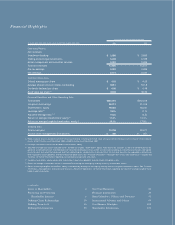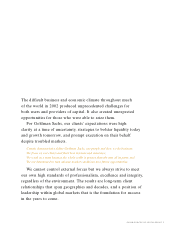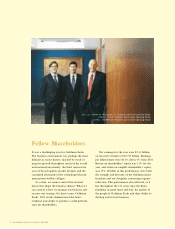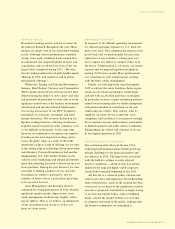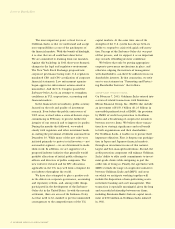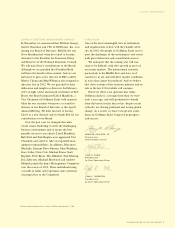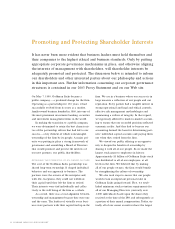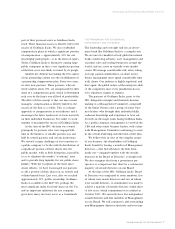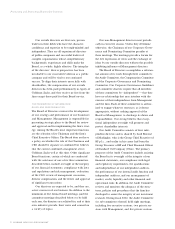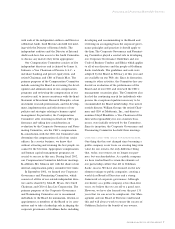Goldman Sachs 2002 Annual Report Download - page 10
Download and view the complete annual report
Please find page 10 of the 2002 Goldman Sachs annual report below. You can navigate through the pages in the report by either clicking on the pages listed below, or by using the keyword search tool below to find specific information within the annual report.
8GO LDMAN SA CH S 2002 A N N UA L R EPO RT
Prom oting and Protecting Shareholder Interests
Our outside directors are first-rate, proven
leaders in their fields who have the character,
confidence and expertise to be tough-minded and
independent. They are all experienced directors
of public companies and successful leaders of
complex organizations whose complementary
backgrounds, experiences and skills make the
Board, as a whole, highly effective. The interplay
of the directors’ diverse perspectives has been
invaluable to our successful evolution as a public
company and will be vital to our continued
success. To align their interests more fully with
shareholders, the compensation of our outside
directors has been paid predominantly in equity of
Goldman Sachs, and they receive no fees from the
firm except those paid for their Board service.
THE FRAMEWORK OF GOVERNANCE:
ROLES AND RESPONSIBILITIES
The Board of Directors oversees the development
of our strategy and performance of our businesses
and Management. Management is responsible for
presenting strategic plans to the Board for review
and approval and for implementing the firm’s strat-
egy. Among the Board’s most important functions
are the selection of its Chairman and the firm’s
Chief Executive Officer. The Board does not have
a policy on whether the role of the Chairman and
CEO should be separate or combined but believes
that the current combined arrangement serves
Goldman Sachs well at this time. Other significant
Board functions, certain of which are conducted
with the assistance of one of its three committees
described below, include oversight of the integrity
of our financial statements, compliance with laws
and regulations and risk management, evaluation
of the CEO, review of management succession,
director compensation, and the review and approval
of significant transactions.
Our directors are expected to be, and they are,
active overseers of our business. In addition to the
minimum of five formal board meetings (and the
committee meetings described below) to be held
each year, the directors are solicited for, and at their
own initiative provide, their views and counsel on
a variety of topics.
Our non-Management directors meet periodi-
cally in executive session. Unless they determine
otherwise, the Chairman of our Corporate Gover-
nance and Nominating Committee presides at
these meetings. The meetings provide a forum for
the free expression of views and the exchange of
ideas by our outside directors without the possible
inhibiting influence of Management directors.
The Board of Directors accomplishes a substan-
tial amount of its work through three committees:
the Audit Committee, the Compensation Committee
and the Corporate Governance and Nominating
Committee. Our Corporate Governance Guidelines
and committee charters require that all members
of these committees be “independent”—that they
have no relationship that may interfere with the
exercise of their independence from Management
and the firm. Each of these committees is author-
ized to engage whatever resources, as it deems
appropriate, without seeking approval of the
Board or Management, to discharge its duties and
responsibilities. Our strong belief is that excep-
tional independent oversight will promote and
protect shareholder interests.
Our Audit Committee consists of four inde-
pendent directors and is chaired by Lord Browne
of Madingley, who is the Group Chief Executive of
BP p.l.c., and earlier in his career had been the
Group Treasurer of BP and Chief Financial Officer
of Standard Oil Company (Ohio). The primary
purposes of the Audit Committee include assisting
the Board in its oversight of the integrity of our
financial statements, our compliance with legal
and regulatory requirements, the qualifications
and independence of our independent auditors,
the performance of our internal audit function and
independent auditors, and our management of
market, credit, liquidity and other financial and
operational risks. In addition, the Audit Committee
reviews and monitors the adequacy of the struc-
tures, policies and procedures that the firm has
developed to assure the integrity of our investment
research. During fiscal 2002, the Audit Committee
(or sub-committees thereof) held eight meetings,
including five executive sessions, two private ses-
sions with Management, and five private sessions


